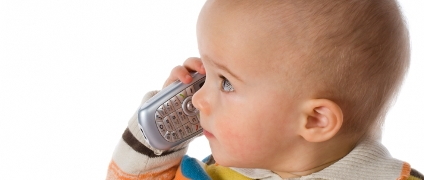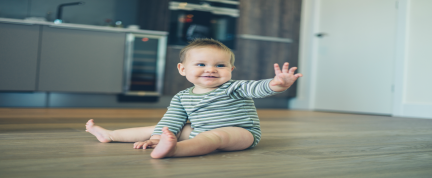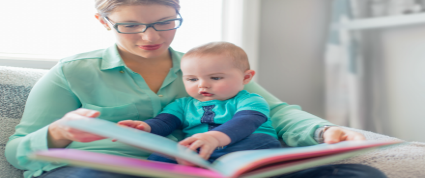
One of the most exciting events for new parents is hearing their baby utter their first words. It's hard to say for sure when to expect this, but most babies will be able to say three to five words by the time they're a year old. You may even hear your baby babbling words like “ma ma” and “da da” as early as six months. Below is what to expect from your child in terms of their language development and age.
Receptive Language Comes First
The receptive language of babies (otherwise known as what they understand) develops before their expressive language (what they say). When you talk to your baby, you’re helping the development of his receptive language and stimulating his overall language development. Even if your baby isn’t able to speak to you, he’s still absorbing information and expanding his vocabulary just by listening to you.
Early Expressive Language
Birth to Three Months
Your baby starts learning to communicate with you very early. One of the first ways your baby does this is by crying. This may not sound like language development, but it’s how they tell you what’s going on. You may even discover that your baby has a different type of cry depending on what they're trying to communicate to you.
Four to Six Months
Your baby will start babbling around this stage of life. They should also be responding to you by smiling and cooing. Even though they aren’t forming actual words by babbling, they should begin to make some of the sounds later used to form words. You may hear them speaking vowel sounds first like “ooh” and “aah.” Later, they will combine consonants and vowels to make sounds like “da da” or “ba ba.”
Seven to 12 Months

Your baby’s receptive language will really start to blossom during this time. They should be able to understand simple instructions like “no.” Your baby may not be talking just yet, but they should be babbling by now. Pay attention to them, and you may notice they're imitating sounds or gestures you make. For example, they may wave “bye bye” or blow kisses. If they haven’t started talking yet, try not to worry. You should be hearing the first words soon.
Baby’s First Words
Your child will likely say their first words between 11 and 14 months. By 18 months, you can expect to be them to say up to 20 words. Not all babies, however, develop at the same pace or reach milestones at the same time. If you ask a group of moms when their children started talking, you will probably get a different answer from each mom. Even when you compare children from the same family, you will see variations on when each child learned to speak. Developmental milestones are designed to help parents and doctors stay alert for signs of problems, but they shouldn't cause you undue worry.
Encouraging Your Baby to Talk

There are many things you can do as a parent to encourage your child to talk. The first step you can take is to imitate your baby’s sounds and in turn encourage them to imitate you. Try smiling when they smile and laugh when they laugh. Make “ooh” and “aah” sounds when they make “ooh” and “aah” sounds. You can also play games like “peek-a-boo” with your baby. They will learn to anticipate what comes next and mimic you during play time. You should also talk to your baby throughout the day. For example, when you dress them, describe what you're doing. Saying simple things like “mommy is putting socks on your feet” will help your baby learn new words and associate them with their definitions. Lastly, you can encourage your baby to talk by reading to them. To introduce vocabulary, use “first word” books. It may take a while before your baby is able to say the words in the book, but they may be able to identify words by pointing.
Should I Be Concerned if My Baby Isn’t Talking?
It is not cause for concern if your baby is under 15 months and not talking, however, they should be babbling by the time they're one year old. If they're not, you should discuss this with your pediatrician. You should also pay attention to how your baby responds to sounds. If they do not respond to their name or turn their head towards the direction of a loud sound—or if you just feel that something is not right—talk to your doctor. If your child is not saying anything at all by 16 months, you may want to arrange early intervention services. Keep in mind that this does not necessarily mean your baby isn’t developing normally. Some perfectly healthy babies do not talk until they are closer to two years old. Still, if you are worried about your baby's speech or language development, discuss your concerns with your pediatrician.
